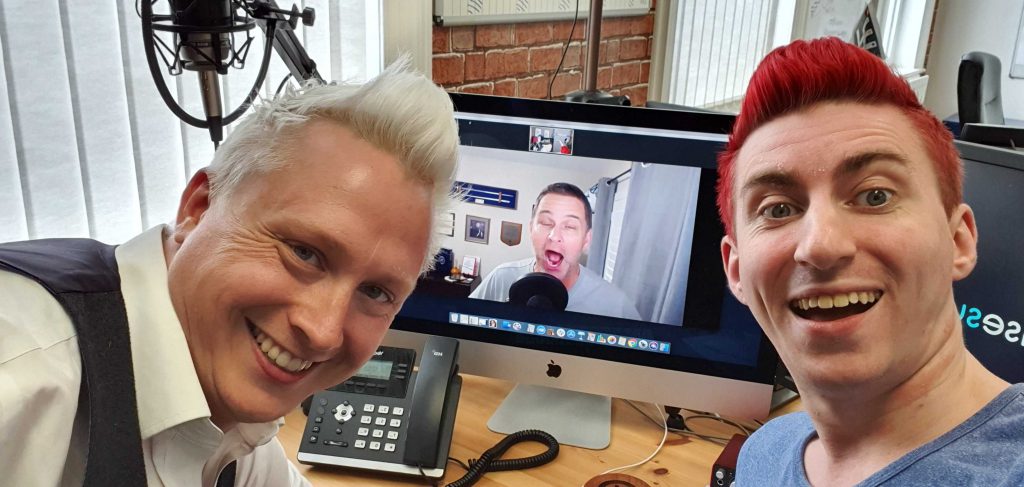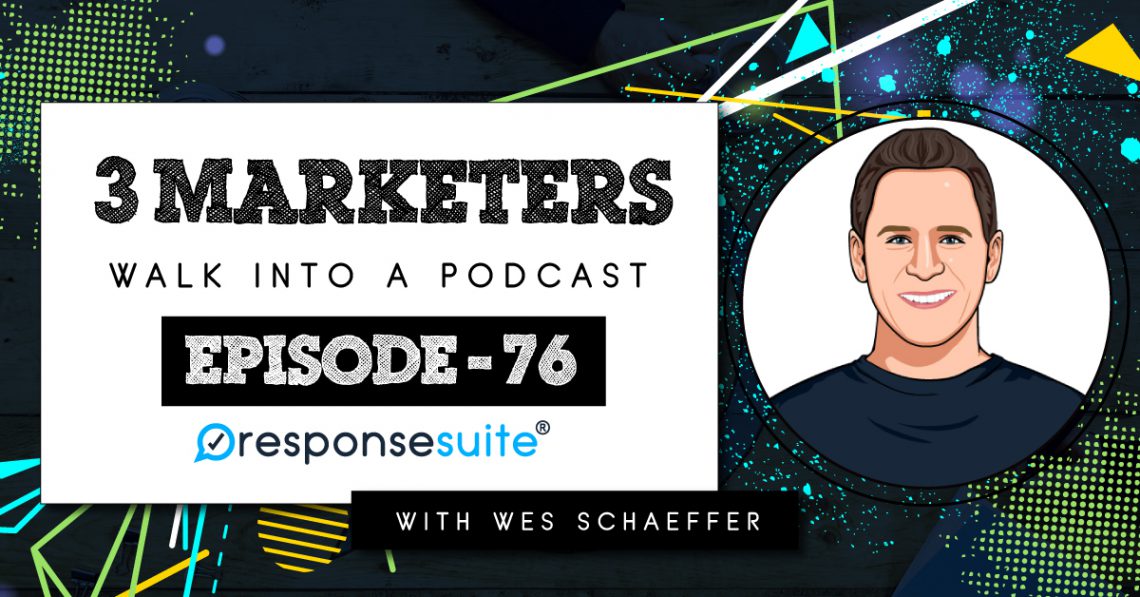Wes Schaeffer is here with us this week to really dive into how to be a better salesperson.
He's sharing fun examples of how to ask your clients the key questions that will help you understand what led them to you, how to focus on those specific aspects, and how to market your product or service better to those clients.
Let's dive in…
Subscribe now on your favourite podcast player:



A lot of us are disappointed that we're not getting the amazing sale rates that we should. What do you think most people are doing wrong?
- Sales have gotten a bad rap over the years. The word sell comes from the Norwegian word that means to serve.
- True professional salespeople want to serve their clients, they know that’s the best way to do things, just as a human being and now certainly with social media and everybody having smartphones in their pockets. They’ll go live and just bash you. They’ll go to yelp and the better business bureau and leave you a one-star review if you manipulate them.
- So even if you are unmovable, unethical, and dishonest, it is still in your best interest to serve your clients because they are going to light you up if you mistreat them and the way to serve is to first diagnose, just like a doctor.
- Maybe I do have exactly what you need but just like a doctor, the flu is going around in the winter, and you call in and show up, and you got puffy eyes, your nose is running, your shivering. He knows with 99% certainty that you have the flu, but if he just walked out in the lobby and said you have the flu, here take this, now pay my $50 co-pay and get out of my office. Some of us would be happy, like great I didn’t even want to come in thank you for the prescription, let me get home and get in bed.
- But you do want to be seen, you do want them to take your temperature, you want them to take your pulse, listen to your chest, because maybe it is the flu, but now maybe it’s an advanced form of the flu and you got pneumonia, so bring me in and listen to my chest. You know because you took the time and I now trust your diagnosis and your prescription.
- Whatever it is your selling, take the time to get to know them and dig in.
Is there a starting point that we can use to kick off that conversation in a direction that’s going to be much more about us inquiring about them rather than us saying, look at all this stuff?
- You almost never want to get into a look at all my stuff because they found you on purpose. So it’s not like I’m just randomly dialing phone numbers and going, oh my gosh I have a plumber on the line, hey what do you do?
- So when I call or go to your website and I schedule an appointment to have a conversation, something has gone on and this is the money question. They already could have hung up, but they don’t, I would simply ask, hey what has happened recently, what has happened that lead to you scheduling this appointment with me today?
So that’s your why, that’s the pre-frame that we get out of you at that point right?
- Yeah. Now this is my regular guy that I go to, but let’s say I scheduled this for the first time when I go in, and this is what he did, I filled out the form, I answered all the questions.. the he is like what happened, what’s gone on, why are you here.. just for maintenance, do you have any injuries, do you need any rehab. So he gets to know me.
- So when somebody calls on the phone, like with me with consulting, they want sales training, they want business coaching.
- Be like ‘hey what’s going on? What has lead you to schedule this call with me right now? Because something has happened.
- Okay, business is down, maybe business is up and they are looking for ways to scale, ways to become more efficient, which tools they should have added to their arsenal to become better, more streamlined.
- And don’t just assume that everybody wants to grow sales. That’s not true. Sometimes people want to maintain, sometimes maybe they want to scale down.
- Somebody called me yesterday, they wanted to lay off some people, their an agency that had an original goal to grow to 10 million dollars and they realized they don’t want to be a 10 million dollar agency, they want to be a 5 million dollar agency and have more of a lifestyle. So don’t assume anything.
So when you go into this sales conversation, are you digging for pain? Is that a bit old school, where do you take it now?
- That’s not old school at all. But it has been documented via artificial intelligence. I have guests on my podcasts that do this and they have analyzed sales calls. So the old adage is that you have two ears, one mouth, use them proportionally, and that’s roughly true.
- But what they found by analyzing thousands of sales calls is that the reality is it’s more evenly matched as far as who is doing the talking. So it’s close to 50/50, but the harder questions are answered very early in the sales conversation.
- You may have two or three or five calls from a more complex sale, maybe a higher ticket, but competitors are discussed, pricing is discussed. You know if my baseline consulting is 10,000 a month for 6 months and you only have 5,000. It’s wasting my time and yours to do a song and dance and have 12 phone calls before any discussed price.
- Get that on the table first, don’t waste any of their time or my time as completely necessary.
- Yesterday I was talking with a company that wants me to come out, we are looking at 60-90 day engagement. I helped them with their CRM, I helped them train their salespeople, but they needed some help developing some of the content. So I said look, rough sketch, this is going to be at least 15,000 up to you 30,000 dollars, are you okay with that, is that kind of what you were thinking? We can adjust it or tweak it a bit, this is not a 5,000 dollar engagement, are you okay with that?
Tell us more about when people have a budget…
- Most people can find the money for what they need that is truly interesting to them. But that’s where you start to bubble things up, I learned this when I was in the air force years ago and was stationed in Korea. I learned to negotiate at the age of 23, which was great because you would go into town and say come here, I got this leather jacket for you, I’ll give you a great price, you know $400, and you think okay it’s a $500 jacket if you bought it back in the states, then if you go hey I’ll give you $350, they say how about $375, so you don’t know where their bottom line is.
- I always said if you’re not embarrassed about your counteroffer, it’s not low enough.
- So if I say $50 and they get offended, you want them to look like you just shocked them, so now you know you are too low, but that’s fine. Now I can work up. You are more likely now to get the jacket for $200 instead of $375.
- To go back to oh man it’s 15,000, we were budgeting 5,000. Now you start to diagnose why were you budgeting 5,000, how is this impacting you if we have to get our prospect to put a price on their pain. That’s where the magic really happens because as we are talking, they are getting more, what happened, what’s going on.
- I just had a phone call before this.. the guy has mail chimp for his email, he has click funnels, but he is growing, he is growing his team, he needs to be able to assign roles. I’m like, how is this going to impact your business if you don’t have these abilities. He is like, too much manpower, it’s too hard to manage the lists, we are losing sales because we are emailing customers with offers as though they were prospects. Or they are getting offended, or they want the discount that we offer. How would you say how much this is impacting you?
- It’s a $2000 profit problem as it is, as we scale it could be a $2000 problem per month. So if we were to show you a $3000 a month option that removed the $2000 pain, is there any reason you could see not moving forward.. hell no. If you can save me 20,000 by spending 3, I’m all ears, fantastic now the price objection is off the table.
Where do you pitch that initial higher price that you are going to go in for in relation to the price you are really happy to go with? What’s the actual price you want?
- You need to price your services, and services are different than physical products unless it’s your own product you got some kind of trademark or patent on, but assuming we are talking about services, you're going to price your services based on the value that you bring.
- I got a client right now, I’m helping them with their Hubspot account and they asked me to help them with something this morning. It took me 3 minutes to fix, it would have taken them probably 30 minutes to an hour, but I’ve used the software for 5 years, I’ve made 897 calls to support and you know learned this stuff, so do I charge based on 3 minutes or do I charge based on the hour I saved them?
- So as we are talking let’s say this guy tells me this is a $20,000 a month problem and let’s say I’m happy to make $3,000. Am I ripping them off if I charge $10,000? Maybe as a one time deal, it’s $20,000, maybe it’s $50,000 because it’s $20,000 a month. That’s a $240,000 problem to them per year. So it’s all how you position it. Maybe you are happy with $3,000, you can underprice yourself and lose the sale.
- Certain people of a certain caliber, they just expect to pay more and they’ve even done studies where they are actually happier when they pay more for certain things.
- They did a study where they wired up people’s brains and gave two cups of wine. They put it in two different glasses and said this is $12 bottle from the local store and this is a $400 bottle brought from the basement, and it was found in a shipwreck. Their pleasure sensors in their brain lit up, then they said by the way these are both the same glasses of wine, it was the $12 bottle. The perception of value is what gave them greater pleasure.
What do we need to do in order to get them to tell you what that problem is worth to them? Can you just ask? Can you be as blunt to say what’s that costing you right now?
- You can if it’s new to you, by all means, just ask. You got to get good at having these conversations. Sometimes it’s a little uncomfortable but you need to be comfortable being in the presence of uncomfortable people. You need to be comfortable making them uncomfortable.
- Just like the doctor, okay take off your clothes, put on this robe, sit on this crinkle paper in this cold office, the doctor will be in a moment. The doctor needs to access to you and the doctor is very comfortable with you being uncomfortable and that’s fine.
- So now there are better ways like the old bedside manner, yeah you know how you conduct yourselves there, you can soften things up like in round numbers. How would you say this is impacting you, well I’m not comfortable sharing that information with you.
- That’s just like going to the doctor, I’m not comfortable de-robing in front of you. Well get out of the office, I need to examine your bod, it’s what I do, if you don’t let me examine you I can’t diagnose, I can't prescribe, it’s malpractice, so either get undressed or leave.
- They go I’m not comfortable discussing that with you, I apologize I must have done something that has created hesitancy, distrust, unease with you and so can you kind of walk me back through this. I mean I do this every day and people are usually pretty comfortable. Is it something I said, have you been ripped off before?
- Have you been mistreated, have you been lied to by vendors? They always over-promise, they always under deliver. I know it happens to me, I understand, but here’s the deal.. I need to know what is happening to even know if I can help you. Was just hoping you could go through the powerpoint presentation, maybe send a catalog.. but really? I have 12 presentations, 2 gigabytes worth of data, a 12 hundred page website, do you really want to go through all that? Or can ask a few questions, and narrow it down to two or three or five pages that you need instead of 300.
- That makes sense because it’s not that they distrust you, the fact that they are at least they are hoping to trust you. The reality is, we all have been let down and mistreated, so we need to understand great salespeople have great empathy.
- We can see things from their perspective. We can walk a mile in their shoes, so we literally or figuratively go around the table, sit on the same side of them and see things from their perspective. Look, I’m in this with you, I really am here to help, but I need you to answer these questions for me to see if I can even help.


A book that you would recommend…
Winning Through Intimidation by Robert J. Ringer
What is your top success habit?
Go to bed early, wake up early.
What are your favourite apps right now?
TextExpander
Here’s the big one… who do you like more, Red Haired Rob or Platinum Kennedy?
Red haired Kennedy!
Finally, where can folks go to find out more about you?
My website is thesaleswhisperer.com


Leave a Comment